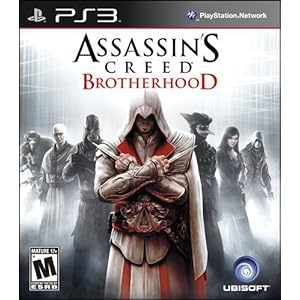
I was a bit surprised by the two year gap between the original Assassin's Creed and the second game when so many franchises these days focus on the yearly schedule, but it didn't take too long for Ubisoft to decide to annualize it. While II jumped the series forward in time a few hundred years (for the bulk of the gameplay, anyway) and used a new main character, Brotherhood is a direct continuation of that character's story, with the added hook of a significant team-building element in the single player and a multiplayer component as well. So in some ways it feels like a secondary game just meant to make some money and remind people that the franchise still exists before the "real" next one comes out, but there are enough developments to the overarching plot and additions to the standard gameplay that it's definitely deserves to stand beside the other games as a legitimate sequel.
So Brotherhood starts shortly after ACII ended, both in Ezio's time and in Desmond's. I thought the game might take place entirely in the past since Desmond already got what he needed from Ezio's memories, but it turns out there's still more he and the team need to figure out, so it's back into the Animus he goes. They hide from the bad guys and he learns more about the history of his ancestor. Due to predictable circumstances Ezio doesn't lose all his ability but most of his equipment is gone, forcing him to rebuild his arsenal as he relocates to Rome. We got a small taste of that famous city at the end of the last game, but Brotherhood lets you explore it fully, and it's the biggest single location in the series. The scale of the games seems to have curiously shrunk over time, with the first featuring three famous cities and the connecting areas, the second including two major locations and a few smaller ones, and Brotherhood having only the one significant location. But it's varied and big enough for the game's purposes, plus there's plenty of opportunities to revisit old locations for a bit.
The progression is similar to ACII for a while, as you discover the plans of the enemy (this time the whole Borgia family) and make some of your own to eliminate their influence over the city. Ezio's more ambitious this time though, aiming to completely remove the Templars from the city by buying out businesses and eliminating anyone of importance who stands against him, and most significantly, taking over the Assassin's brotherhood and building his own army of recruits. These systems add a lot to the feel of the game without being too distracting, as it's just a few minutes of navigating menus to maintain your affairs and the recruits come with the benefit of being able to help you out in battle as needed. All of these ideas are actually pretty simple in execution when you really look at them, but they're robust and interesting enough to make an action game like Brotherhood seem more important than one man's quest for revenge.
They do a surprising amount on Desmond's side too, letting you see a few familiar areas in a new light, bringing back ideas like snooping through emails, showing you how his assassin training is really progressing, and ending on a cliffhanger that left me both surprised and anxious to see what happens next. In addition to the required stuff, the optional content seems more considered this time. The secret puzzles left by subject 16 are back, but in addition to that you can do things like unearth some repressed, sad memories from Ezio's past and do some extra assassinations a bit more complicated than the ones in the last game. And of course there's the online, which doesn't seem to have the biggest PSN community but was pretty fun in the little of it I managed to play. You choose a character and try to track down another player while the same is being done to you, and the constant cat-and-mouse assassinating and balance between blending in and knowing when to use your flashier skills are cool enough that you don't really care who wins, just because it's interesting to screw around with.
There's not a whole lot new with the audio or video, with the voice cast and familiar soundtrack returning and not too many graphical enhancements. It's nice that you can get from one end of Rome to the other without loading, and they at least managed to fix most of the faces, making Kristen Bell's Lucy no longer resemble a human-fish hybrid. There's nothing too exciting about Ezio's story for the most part, and unfortunately the reason for most of the conflict in the whole game is pretty poor. Despite the crazy conspiracy plot, the team has been pretty faithful about honoring what the historical figures they play with were generally doing at various points and when they actually died, but the justifications for certain things seemed flimsy when a bit of tweaking would have made it all make sense. There's no reason Ezio wouldn't have killed some of these guys when he had the chance, so having him randomly decide not to rather than creating a situation where he couldn't just seems lazy. But otherwise I still enjoy what they do with the story, and the modern stuff in particular was pretty good. They do a good job of making all of the characters likable this time, and that aforementioned ending is memorable and actually a pretty significant bummer. I wasn't expecting the story to affect me the way it did, and I guess that's worth noting. There should be another game later this year, and whatever time period it takes place in, I'll probably be enjoying it.
AAAAAGGGHHHH
16 years ago


































No comments:
Post a Comment